Impactful Ocean Conservation Quotes and Their Significance

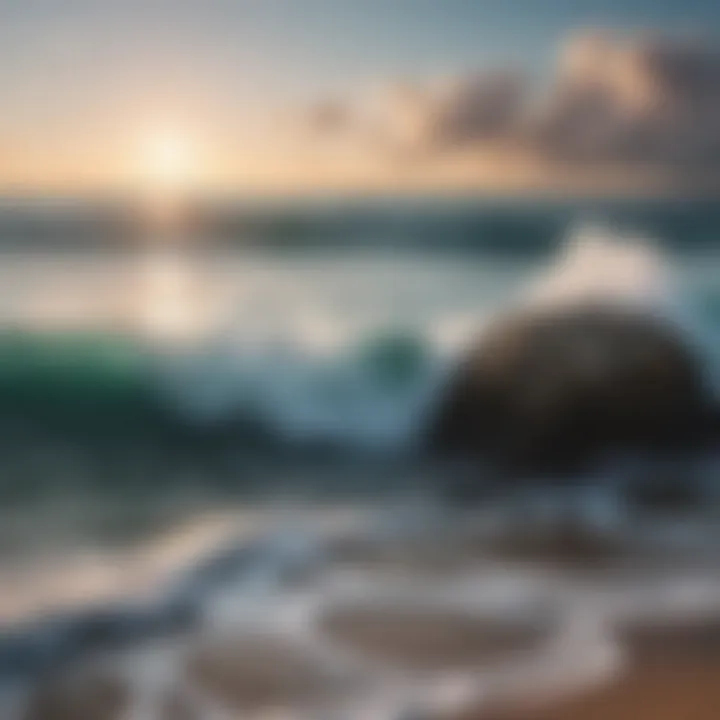
Intro
The ocean is an endless tapestry of life, colors, and mysteries that has inspired countless individuals throughout history. Often, it’s the wisdom encapsulated in quotes that resonates with our fundamental connection to these vast waters. Words spoken by environmentalists, authors, scientists, and dreamers serve as both reminders and calls to action in the fight for ocean preservation. As we dive into this exploration of ocean conservation quotes, it becomes clear that these remarks do more than simply echo sentiments; they shape awareness, fuel advocacy, and ignite a shared responsibility towards maintaining the health of our oceans.
Understanding the implications of these quotes reveals the layers of meaning that can drive us towards collective action. In this journey, we will reflect on selected quotes, scanning the depths of their motivations and insights. The philosophical underpinnings of such statements often reveal a profound respect for marine ecosystems and an understanding of the delicate balance that sustains life beneath the surface. This exploration aims to capture the essence of oceanic conservation, commingling personal reflection with broader environmental contexts.
In a world facing imminent ecological challenges, the relevance of these quotes becomes even more pronounced. They resonate with contemporary conservation efforts, inviting individuals to ponder their roles in turning the tide for marine habitats. By examining diverse perspectives, this piece highlights not only a passion for our oceans but also an urgent call for action. Join us as we navigate quotes, lessons, and philosophies that illuminate the path towards more conscientious stewardship of our planet's blue heart.
Understanding Ocean Conservation Quotes
Ocean conservation quotes serve as a powerful tool in our ongoing efforts to connect with what truly matters—the sustainability of our marine environments. These quotes aren't mere words strung together; they encapsulate profound thoughts and insights about the oceans, their ecosystems, and our responsibility towards them. Exploring these phrases can illuminate the urgent need for awareness and action in a world where our waters face increasing threats from pollution, overfishing, and climate change.
One significant benefit of analyzing ocean conservation quotes lies in their ability to inspire emotional responses. Words can ignite passion and motivate individuals to advocate for changes in policy, consumer habits, or personal choices. When a quote reflects the majesty of the ocean or the plight of its inhabitants, it can resonate deeply with readers.
Moreover, these quotes often provide a lens through which we can examine broader environmental themes. They can highlight the interconnectedness of all living beings and the ethical dimensions of our choices.
In this sense, ocean conservation quotes become not just statements, but catalysts for discussions about ecological ethics and sustainability practices. They invite us to think critically about our role in the marine ecosystem and our impact on marine life.
Defining Ocean Conservation
Ocean conservation refers to the protection and preservation of ocean environments and marine biodiversity. It encompasses a broad range of activities aimed at safeguarding ocean resources, from establishing marine protected areas to combatting pollution and advocating sustainable fishing practices. Simply put, ocean conservation is about maintaining the health of our oceans for future generations while recognizing the vital role healthy oceans play in global ecological balance.
An effective ocean conservation strategy must consider not only the marine species being protected but also the human communities that rely on these ecosystems. This interconnected perspective enhances our understanding of conservation efforts and promotes cooperative engagement across various sectors.
The Role of Quotes in Advocacy
Quotes in the realm of advocacy serve multiple purposes. First, they act as memorable rallying cries, encapsulating ideas in a way that can be easily shared and remembered. When individuals read a compelling quote, they are often compelled to share it across platforms, whether social media, blogs, or at rallies.
Moreover, quotes can give voice to complex ideas and frame conservation challenges in relatable terms. For instance, a simple yet powerful statement about the beauty of marine life can suddenly make the abstract notion of conservation feel immediate and personal.
In advocacy campaigns, these quotes often highlight disparities or injustices faced by marine fauna and flora, thus fostering a sense of urgency among the public. They contribute to a narrative of conservation that emphasizes collective responsibility, urging decision-makers to take action.
Overall, the thoughtful use of quotes in advocating for ocean conservation can both educate and mobilize communities. By tapping into the emotional and intellectual potential of words, we cultivate the awareness essential for enacting change.
Cultural Perspectives on Ocean Conservation
Understanding cultural perspectives on ocean conservation is vital in comprehending the multifaceted nature of environmental advocacy. Various cultures possess unique relationships with marine life, often rooted in traditions, values, and experiences that shape their views towards the oceans. By examining these perspectives, we can better appreciate the diversity in approaches to ocean conservation and the shared responsibility that transcends geographical borders.
Considering these cultural insights can lead to more inclusive and effective conservation practices. The interconnectedness of humanity and nature becomes evident when we recognize how local customs inform sustainable practices. In a way, it’s about learning from one another while uniting efforts toward the common goal of marine preservation.
Indigenous Views on Marine Life
Indigenous communities have long held a profound affinity for the oceans, often viewing them as sacred spaces full of life and meaning. For instance, the coastal tribes of the Pacific Northwest regard the salmon not just as a food source but as a central element of their cultural identity. Their quotes likening the salmon to a lifeblood resonate deeply within their community, highlighting a sense of stewardship over marine resources.
“Take only what you need, give back abundantly,” is a principle that exemplifies their approach. Through deep-rooted traditions passed down generations, these communities teach the significance of maintaining balance with nature. By honoring the ocean, they foster a sense of community responsibility, ensuring marine ecosystems thrive.
Moreover, these indigenous perspectives also contribute to contemporary conservation strategies. Their practices often prioritize sustainability, guiding modern conservationists towards more respectful and holistic management of marine ecosystems. Understanding their insights reinforces the idea that ocean conservation is not merely a scientific endeavor, but a cultural rallying point that invites collaboration across various groups.
Global Movements and Quotes
As awareness of ocean conservation grows, numerous global movements have emerged advocating for drastic changes in policy and public perception. Quotes from figures such as Sylvia Earle, who famously stated, "The ocean is the heart of our planet," encapsulate the urgency and necessity for protection of marine environments. These sentiments resonate within a broader audience, pushing the conservation narrative into the limelight.
Such quotes serve as rallying cries, inspiring movements like the Great Global Cleanup, which emphasizes community participation in protecting our oceans. They motivate individuals to take ownership and participate actively in cleanup efforts, demonstrating that even small actions compound into significant impacts.
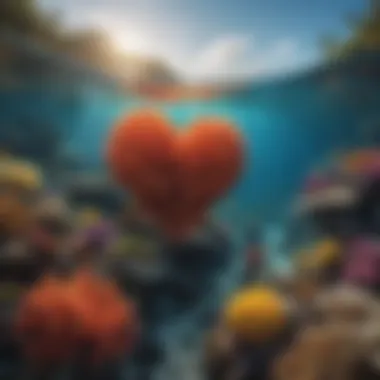

Notably, social media has amplified the reach of these quotes, allowing them to ignite discussions and foster a sense of urgency regarding marine preservation. Messages that resonate with the public lead to movements that can no longer be ignored, highlighting the changing tide of public perceptions about our oceans.
In summary, cultural perspectives on ocean conservation offer invaluable insights. From indigenous wisdom guiding sustainable practices to global advocacy fueled by powerful quotes, understanding these elements is crucial. Integrating these lessons into broader conservation efforts fosters resilience in preserving the oceans for generations to come.
Notable Quotes and Their Origins
In the vast sea of conservation efforts, notable quotes serve as guiding stars, illuminating paths towards awareness and action. They encapsulate the ethos of ocean preservation in a manner that mere data or statistics cannot. Quotes resonate with individuals on a personal level, often reflecting shared values and beliefs about marine life and its significance in our world. By weaving together history, culture, and advocacy, these quotes become powerful tools not just for inspiration, but for mobilizing efforts around ocean conservation.
Historical Quotes from Environmental Pioneers
Historical figures have long recognized the intricate relationship between humanity and the ocean. One significant voice is that of Jacques Cousteau, who famously stated, "People protect what they love." This quote encapsulates the motivation behind many conservation efforts: a deep-seated love for the natural world can drive individuals to take action. Cousteau's adventures forged an emotional bond between the public and the ocean, fostering a sense of responsibility towards its welfare.
Another pioneer, Rachel Carson, echoed this sentiment with her words: "The sea, once it casts its spell, holds one in its net of wonder forever." Carson's work during the early days of environmental activism highlighted the beauty and fragility of marine ecosystems, sparking a movement that paved the way for modern environmentalism.
These quotes, among others, serve to remind us of the foundational beliefs that fuel the ocean conservation movement. They illustrate how sentiment and experience can unify people towards a common cause, ultimately shaping attitudes and influencing policy.
Modern Voices in Ocean Conservation
In a contemporary context, numerous voices continue to advocate for the oceans. Sylvia Earle, a renowned marine biologist, frequently uses quotes to bridge science with public engagement. Her statement, "No water, no life. No blue, no green," emphasizes the essential nature of marine ecosystems to the health of our planet. Such quotes not only inform but also encourage action, making them an integral part of modern advocacy.
Moreover, organizations like Ocean Conservancy utilize impactful phrases to galvanize support for environmental legislation. Their campaign slogan, "Trash Free Seas," succinctly highlights the critical issue of marine debris while inspiring collective action to fight against ocean pollution.
Quotes from today’s activists frequently address modern challenges like climate change and plastic pollution, underlining the urgency of their messages. They act as catalysts for movements, encapsulating vast knowledge in a few powerful words that can travel across social media platforms and resonate widely.
"The ocean is not just a container of marine life, but also a critical component of planetary health." - Unknown
In summary, notable quotes from historical figures to modern voices underline the importance of ocean conservation. They weave a complex tapestry of advocacy, merging emotions and facts to inspire collective action. As we navigate forward in this ongoing journey, these quotes provide a solid foundation for understanding and addressing the myriad challenges facing our oceans.
Impact of Quotes on Public Perception
Quotes carry a weight that exceeds their mere words. In the realm of ocean conservation, they serve as both rallying cries and gentle reminders. The effectiveness of these quotes isn't just in their poetic nature; it lies in their ability to reshape public attitudes and foster a sense of urgency regarding marine protection. By spotlighting the fragility of ocean ecosystems, these statements encourage individuals to reflect on their relationship with the sea. The potency of a well-phrased quote can ignite discussions, turning passive observers into active participants in conservation efforts.
When individuals encounter thought-provoking quotes, they often feel a personal connection to the issue being highlighted. For instance, a phrase like "We don’t inherit the earth from our ancestors; we borrow it from our children" can evoke emotions tied to responsibility and legacy. This emotional resonance is crucial, as it can sway opinions and motivate action where statistics may fail.
In essence, the strategic deployment of these quotes can influence public perception in several significant ways:
- Raising Awareness: Attentive quotes can cut through the noise, sparking curiosity about ocean conservation and related topics.
- Promoting Advocacy: When quotes encapsulate the urgency of the situation, they serve as catalysts for advocacy, encouraging people to rally for environmental causes.
- Encouraging Dialogue: Memorable quotes often find their way into discussions, both in online spaces and face-to-face, enabling a more profound public discourse about marine issues.
As we explore how these quotes shape attitudes towards marine ecosystems, it’s clear that their impact stretches far beyond words.
Shaping Attitudes Towards Marine Ecosystems
The way people perceive marine life and ecosystems is intimately tied to the language surrounding them. Quotes that capture the essence of ocean beauty or the dire threats it faces can influence public sentiment and drive change. Consider the following:
- Emotionally Charged Language: A quote like "The ocean stirs the heart, inspires the imagination, and brings eternal joy to the soul" bypasses logic and speaks directly to emotions. When people feel enchanted by the ocean's allure, they may be more inclined to care for it.
- Urgent Messaging: Quotes presenting stark realities can jolt people awake. Statements that expose the detrimental effects of pollution and overfishing force individuals to confront uncomfortable truths, making them more likely to switch their behaviors.
- Personal Commitments: When influential figures share personal connections to the ocean through quotes, it humanizes the message. For instance, sharing a sentiment about a childhood memory spent by the sea fosters a sense of nostalgia and can motivate individuals to protect similar spaces for future generations.
This transformation of attitude is critical in fostering a culture of conservation. The language we choose to encapsulate our experiences and understandings of the ocean has a ripple effect that can inspire a wave of change.
Quotes as Tools for Education
Quotes are not just whimsical expressions; they can function as powerful educational tools that relay complex concepts in digestible formats. In ocean conservation, they have the power to demystify scientific findings and make the information more accessible to the general public.
Consider the various ways in which quotes can enhance educational endeavors:
- Simplicity and Clarity: A quote summarizing a scientific concept succinctly can facilitate understanding. For example, quoting an expert who states that "Healthy oceans are vital for life on Earth" succinctly frames the overarching importance of marine well-being.
- Fostering Curiosity: Provocative quotes can pique interest and encourage further investigation into a topic. When individuals are inspired by statements such as "The future will be green or not at all", they may delve deeper into environmental education, seeking out additional resources.
- Integration into Curricula: Educators can harness the power of quotes to create engaging lessons. Using notable quotes within marine biology or conservation studies can create a more dynamic teaching experience, relating the subject matter to broader themes of responsibility and stewardship.
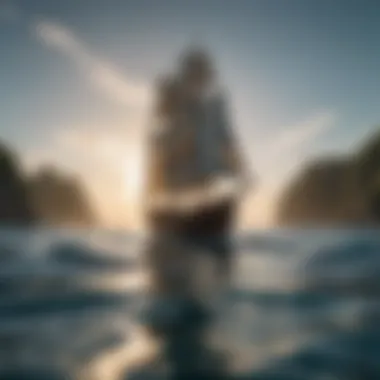

In this way, quotes become versatile instruments that not only raise awareness but also support in-depth learning about ocean conservation.
"The sea, once it casts its spell, holds one in its net of wonder forever."
— Jacques Cousteau
By curating a collection of enlightening quotes, we provide actionable insights into why, and how, society should prioritize marine conservation. This approach ultimately aids in solidifying the foundational understanding necessary for real change.
Quotes Reflecting Scientific Insights
When it comes to understanding the nuances of ocean conservation, scientific insights play a crucial role. Quotes reflecting these insights can encapsulate complex ideas in a way that's digestible, allowing both enthusiasts and laypeople to grasp the significance of marine ecosystems. They serve to bridge the gap between the intricate details of marine biology and the public's understanding of environmental issues. Insights from leading scientists and researchers can enlighten audiences on the delicate balance of marine life, the importance of biodiversity, and the role humans play in preserving or endangering these ecosystems.
The significance of this section lies not just in sharing valuable information. It helps to reevaluate how we perceive the oceans. When we quote scientists who dedicate their lives to studying marine environments, we bring weight to the urgency of the cause. It shifts the narrative from that of mere advocacy to one grounded in empirical evidence, making it clear that ocean conservation is not just a preference, but a necessity.
Diverse Ecosystems: What Science Tells Us
Across the globe, oceans teem with a mesmerizing array of life forms, each playing its role in a well-orchestrated ballet of existence. The diversity of these ecosystems is a testament to the resilience and complexity of nature. Quotes from marine scientists often highlight this often-overlooked treasure trove of diversity.
For instance, a commonly cited statement by renowned oceanographer Sylvia Earle emphasizes that "the sea is a living entity, full of intricate connections and dependencies". This underscores the interrelatedness of oceanic life, where the health of one species is intrinsically tied to another. Understanding these relationships is critical; disruptions in one part of the ecosystem can lead to consequences that ripple through the entire marine environment.
Moreover, a study by the United Nations reported that over thirty percent of marine species are at risk of extinction. This observation often leads to poignant summations by scientists about our responsibility: "We protect nature, and nature will protect us." Such quotes not only inform but also compel action, urging us to consider how relatively simple choices we make can significantly impact ocean health and diversity.
Synthesizing Quotes from Marine Biologists
The beauty of marine conservation quotes doesn’t just lie in their content but in their ability to inspire and galvanize action. Marine biologists like Dr. Jane Lubchenco have often used their platforms to broadcast the urgent truth about ocean health. For her, conservation is not merely about saving fish and coral; it's about ensuring the very fabric of life on Earth remains intact.
Dr. Lubchenco once stated, "No ocean, no us." This concise yet powerful notion poses a stark reminder that the oceans' health is directly linked to our own survival. Such sentiments resonate widely; they are repeated, reshared, and often become mantras within the conservation community.
These quotes shine a spotlight on the urgency of scientific findings, serving as a call to arms for those who hold the protection of the ocean dear. When these marine insights are distilled into impactful quotes, they become tools for education and advocacy, fostering a deeper understanding of the oceans’ complex realities. By synthesizing these voices, we cultivate a collective awareness that can influence public policy, behavior, and community engagement in ocean conservation initiatives.
Quotes and Legislative Change
In the realm of environmental activism, words carry immense power. For those invested in ocean conservation, quotes often serve as catalysts for legislative change. These statements don't just reflect sentiments; they encapsulate aspirations and demands that resonate deeply with the public consciousness. By harnessing the persuasive potential of quotes, advocates can galvanize support for policies aimed at preserving marine ecosystems.
The importance of quotes in legislative efforts cannot be overstated. They offer succinct yet impactful messages that can penetrate even the thickest bureaucratic barriers. When framed appropriately, these quotes can motivate constituents to raise their voices, urging lawmakers to take action. Furthermore, the emotional weight often encapsulated in a well-crafted quote can cut through political rhetoric, engaging those who may not typically concern themselves with environmental issues. This blend of emotion and clarity becomes a tool to forge connections between legislators and their constituents, fostering a sense of collective urgency around ocean conservation.
Driving Policy through Advocacy
Effective advocacy is rooted in the ability to influence policy at various levels of governance. Quotes play a significant role in this dynamic. An advocate who articulates a compelling quote can sway public opinion and, in turn, impact governmental decisions. For instance, consider the iconic words of marine biologist Sylvia Earle: "No blue, no green." These words succinctly emphasize the link between ocean health and planetary wellbeing.
Advococates, environmental organizations, and concerned citizens might utilize such quotes as rallying cries for campaigns, ensuring that the seemingly distant issue of ocean health becomes personal and immediate. The result is a community vocal in its demands for policies that protect marine environments. This can lead to the introduction of bills aimed at combating plastic pollution or restoring coral reefs—issues that, while complex, can be grasped through evocative phrases.
Case Studies of Effective Quotes in Legislation
Several instances in history illustrate how quotes have propelled legislative changes related to ocean conservation. One notable example is the use of ocean advocate Jacques Cousteau's declaration: "People protect what they love." This phrase became a pivotal slogan during campaigns for marine protection areas in various regions around the world. Thanks to grassroots efforts utilizing Cousteau's words, numerous countries have established marine protected areas, thereby safeguarding vital habitats.
Additionally, during the fight for the Clean Water Act in the United States, quotes from citizens and environmental leaders alike highlighted the urgent need for cleaner oceans. For example, the phrase "Protect our waterways, protect our lives" resonated widely, pushing legislators to recognize the issue's importance among their constituents. By pairing these compelling messages with factual evidence and organized advocacy efforts, activists were able to effect significant change in the legislation.
This interplay between powerful statements and policy progression demonstrates that in the world of ocean conservation, words can indeed lead to actions that preserve the vitality of the sea for future generations.
"Our greatest glory is not in never falling, but in rising every time we fall." - This applies in many ways to the relentless pursuit of ocean conservation. Inspirational quotes remind us that perseverance in these efforts can lead to meaningful change, shaping policy and preserving our oceans for years to come.
Social Media and Ocean Conservation Quotes
In the realm of environmental advocacy, especially concerning ocean conservation, social media plays a crucial role. It’s not just a platform for sharing memes or personal anecdotes; it has evolved into a powerful tool for raising awareness. Social media allows ocean conservation quotes to reach a vast audience in an instant, making it possible for powerful messages about marine preservation to resonate as widely as they can.
The Viral Nature of Conservation Quotes
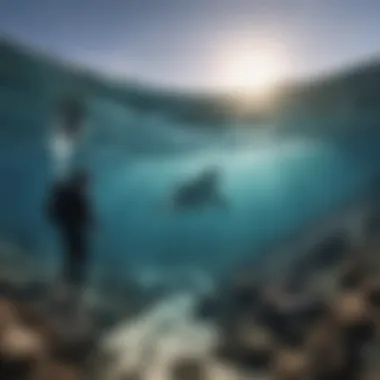
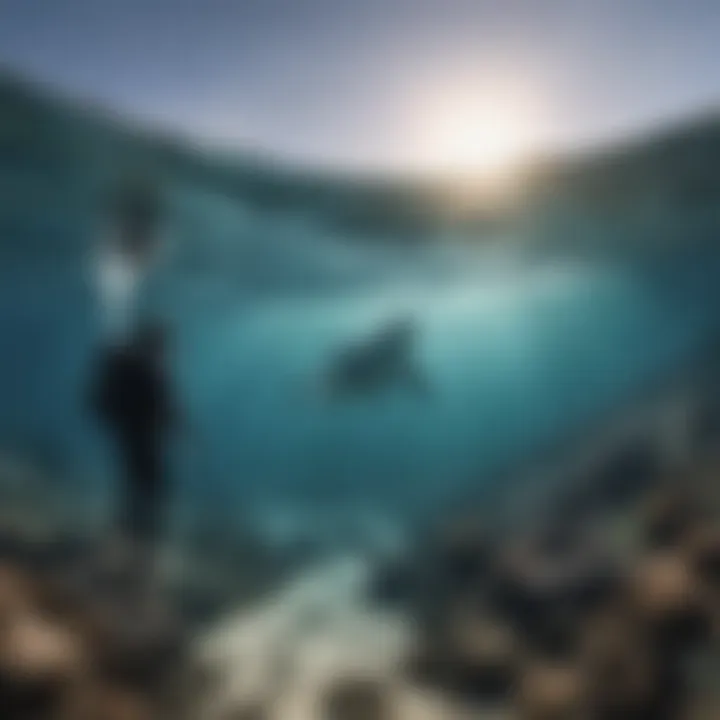
Quotes about ocean conservation have a unique way of going viral. People are drawn to succinct, impactful statements that encapsulate larger ideas in just a few words. When an influential figure, like Sylvia Earle or Paul Watson, shares a thought-provoking quote, it can spread like wildfire. This phenomenon isn’t just chance; it’s a reflection of a society hungry for inspiration and actionable ideas.
- Short But Mighty: The brevity of quotes often makes them easier to share, remembering them can be as simple as memorizing a catchy song.
- Visual Appeal: Social media thrives on visuals. When quotes are paired with stunning imagery of oceans and marine life, engagement skyrockets. People don’t just read; they share, comment, and connect.
- Cultural Relevance: Quotes tend to reflect the current mood of society. As conversations about climate change and marine conservation heat up, well-timed quotes can enhance community discourse.
As a result, what starts as a single post can quickly turn into a movement. The ripple effect of sharing conservation quotes fosters a sense of collective responsibility towards protecting the oceans.
"The ocean is the heart of our planet, and its health reflects our moral standing." – Unknown
Creating Movements through Digital Platforms
Digital platforms are where modern movements often take shape. Through social media, ocean conservation advocates can mobilize support like never before.
- Organizing Campaigns: Platforms like Facebook and Instagram serve as bulletin boards for organizing campaigns. Whether it’s a beach cleanup or a petition to ban single-use plastics, quotes can galvanize action and unite individuals with a common goal.
- Fostering Community: Facebook groups and Twitter chats allow people to connect, share stories, and exchange knowledge. This sense of community adds weight to the messages conveyed and encourages dialogues about marine issues.
- Educational Resources: Social media channels become hubs for sharing educational content. Users can learn about the state of ocean ecosystems, and impactful quotes can summarize crucial data while appealing to emotions. It’s a blend of education and inspiration that encourages sharing.
With the swell of these digital initiatives, one can see how ocean conservation quotes can amplify voices, rally enthusiasts, and empower those who are willing to take steps towards creating a cleaner, healthier ocean. The implications of leveraging social media for these messages are clear – it is transforming the way we engage with ocean conservation.
Philosophical Reflections on Marine Conservation
Philosophical reflections on marine conservation delve into the intricate relationship humans have with the ocean. It's about more than just protecting coral reefs or preserving whale migratory routes; it grapples with the ethical principles and responsibilities stemming from our dependence on these ecosystems. Often, discussions of marine conservation are entangled with broader existential queries regarding the value we ascribe to nature, the rights of non-human entities, and our role as stewards of the planet.
Examining these dimensions helps illuminate the underlying motivations for ocean protection. It compels us to consider how our actions impact not only our own existence but the health of myriad life forms that share the water. The oceans are not just resources to exploit; they are profound systems supporting life and biodiversity.
Moreover, the consideration of ethical dimensions can enhance advocacy efforts. When individuals resonate with moral imperatives—like the notion that all creatures deserve a chance to thrive—they often find that these reflections inspire action. Understanding the philosophical stakes often emphasizes the urgency of collective action.
"The sea, once it casts its spell, holds one in its net of wonder forever." – Jacques Cousteau
In using compelling quotes as catalysts for thought, advocates can weave together narratives that draw attention to pressing issues and encourage deeper commitments to conservation.
Ethical Dimensions of Ocean Preservation
The ethical dimensions of ocean preservation push us to grapple with fundamental questions about rights, responsibilities, and ethical frameworks. A key element is the idea of intrinsic value—recognizing that marine life possesses value independent of its utility to humans. This perspective can shift how society approaches conservation.
For instance, one might reflect on how industrial activities adversely affect not only the health of the ocean but also its inherent worth. Should we allow the noise and pollution from shipping lanes to disrupt the majestic lives of orca pods? The answer is often a resounding no for those who perceive oceans as fundamental to the earth's health—an interconnected web where every strand matters.
Additionally, engaging with philosophies like biocentrism or ecocentrism allows a more profound appreciation for marine ecosystems. These theories advocate for a holistic view of natural systems, promoting a greater responsibility to protect all living beings. When individuals adopt such viewpoints, they cultivate deeper respect for the oceans and are often motivated to act—whether that means adopting sustainable practices or participating in clean-up efforts.
Human Responsibility towards the Sea
Human responsibility toward the sea emphasizes our integral role within the earth's ecosystem. We've consistently exploited ocean resources, often leading to substantial harm. As stewards, we are obligated to halt practices that degrade marine environments. It either requires thoughtful action or a complete shift in perspective regarding our entitlement to oceanic resources.
To fully embrace this responsibility, one must understand the ripple effect of their actions. Simple choices—like reducing plastic use or supporting sustainable seafood—can lead to significant positive changes in marine health. Furthermore, fostering awareness among local communities about their impact on oceans elevates collective accountability.
Ultimately, responsible action is about aligning our everyday practices with a greater ethos of conservation. Recognizing that our survival is entwined with the health of the oceans is a poignant realization that necessitates immediate and sustained action. When we encourage dialogue around these responsibilities, it fosters a culture of care that can lead to more effective conservation efforts.
End: The Path Forward
In the ever-evolving landscape of ocean conservation, the journey does not end with awareness—it's only the beginning. As we piece together the puzzle of environmental advocacy, it becomes increasingly clear that weaving quotes into our broader narrative is paramount. These expressions capture emotions, crystallize thoughts, and plant seeds of inspiration. When uttered or shared, they serve not only as reminders but also as rallying cries for action.
Integrating Quotes into Advocacy
To effectively harness the power of quotes, they must be more than just pithy statements recited at rallies or shared on social media. Quotes need to be embedded within educational programs, policy proposals, and community initiatives. For instance, incorporating a poignant remark from a marine biologist in a _____________: proposal can bolster its emotional weight, making it resonate more with policymakers.
By linking quotes to specific actions and outcomes, we elevate their importance from mere words to tangible calls for change. Imagine including a quote in a local beach clean-up campaign that echoes the urgency of protecting our marine environments. This strategy can make people ponder and incite them to act, thereby fostering a deeper commitment towards preservation.
Fostering a Collective Mindset
Collective responsibility is the backbone of sustainable practices. Quotes can bridge individual experiences and collective action. When individuals reflect on a quote that resonates, they might feel compelled to share their experiences in community forums, such as those found on _____________: or even at local meetings.
Encouraging dialogue around these quotes not only fosters understanding but also builds a sense of community and shared purpose. To truly make strides in ocean conservation, we need to cultivate a mindset where each individual sees their actions as part of a larger tapestry of efforts aimed at preserving our oceans. As the saying goes, "We don’t inherit the earth from our ancestors; we borrow it from our children." This sentiment can catalyze group action, driving home the message that protecting our marine life is a shared endeavor.
Ultimately, the journey forward lies in embracing the wisdom these quotes impart while catalyzing collaborative actions. Every step taken, every voice raised, and every quote shared provides momentum for our collective commitment to the vast, blue depths that sustain our planet. In this continual dialogue, we carve a pathway toward a more sustainable future, one filled with hope, responsibility, and respect for the ocean.















